“Find something in life you’re passionate about. Focus on your dream, and it will shape who you become.”
That’s the life advice of Michael Adjei, MD, a Ghanaian immigrant who is the first Black man to become a chief resident in anesthesiology at Indiana University School of Medicine. He recently received an inaugural Diversity Champion Award presented by the Multicultural Physicians’ Alliance (MPA) for his work in mentorship, recruitment and retention of medical students and residents from backgrounds underrepresented in medicine (URiM).
“Our patient population is getting more and more diverse, and we also need to diversify our physician workforce,” said Adjei, who will be staying on as faculty in the Department of Anesthesia after graduating residency. “The main goal of my work with MPA is to increase diversity of incoming residents, give them a sense of community and belonging, and keep these bright doctors here at IU. I want to show this is a good place to work in a friendly environment that is very supportive of diversity.”
That has been Adjei’s experience ever since coming to IU School of Medicine in June 2015 for the Master of Science in Medical Science (MSMS) Program. The post-baccalaureate program prepared him to succeed in medical school. He earned his MD in 2020 and is now entering his final year of training in clinical anesthesia. Throughout his educational journey at IU, he has been supported by mentors while forging a path for others who come behind him.
“Despite the struggles you’re going through now, there’s a patient who is waiting for you and your expertise to take care of them someday,” he advises his mentees. “Keep that in mind, and keep going.”
A place at the table
Since childhood, Adjei’s driving passion was to become a healer. But the path from Ghana, West Africa, to medical school in Indianapolis wasn’t without roadblocks.
Good thing resilience runs in his blood.
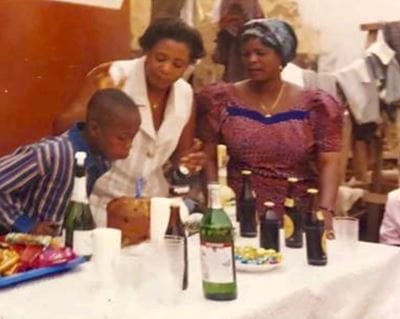 When he was in elementary school, his mother went to work in Europe. He and his three younger siblings were raised by their aunt in the small town of Odumase-krobo in eastern Ghana. Adjei’s mother later worked at a restaurant in Virginia, sleeping on a friend’s couch so she could send most of her income back home to pay for the best education possible in Ghana for her children.
When he was in elementary school, his mother went to work in Europe. He and his three younger siblings were raised by their aunt in the small town of Odumase-krobo in eastern Ghana. Adjei’s mother later worked at a restaurant in Virginia, sleeping on a friend’s couch so she could send most of her income back home to pay for the best education possible in Ghana for her children.
“My mom sacrificed to help me realize my dream,” Adjei said.
His aunt—raising 10 children total—was a formidable matriarch with high expectations for education. At the end of each semester, she collected report cards and called only those who made top grades to sit at her table.
“It was this huge honor to put your hand in her bowl to eat with her – like eating with the president,” Adjei said. “I thought, ‘I want to sit at this table at the end of every semester.’ That was my primary motivation for studying hard.”
Twice, when Adjei became the top student in his class, his aunt told him it was time to move to a better school with more challenging curriculum – forcing him to make new friends.
“That has made me very determined and resilient,” he said. “It trained me for overcoming challenges.”
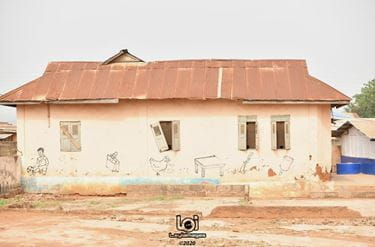 At one point in his youth, some of Adjei’s friends went missing from the playground as diseases broke out in Ghana, including malaria and polio.
At one point in his youth, some of Adjei’s friends went missing from the playground as diseases broke out in Ghana, including malaria and polio.
“One day UNICEF and Red Cross came to town, and they gave us polio vaccinations,” he recalled. “I didn’t really understand what it was doing, but I knew it was helping the community. My friends were not getting sick anymore, and they started coming back to the playground. I wanted to be somebody who could help save lives like that and put a stop to disease.”
That’s how the passion ignited.
It was further fueled when both his grandpa and the aunt who raised him passed away from what would have been “minor complications” at a local hospital, said Adjei, who joined his mother in the United States, alongside his siblings, in 2009.
He’s been back to Ghana three times since then. The last time was as a medical student in 2018 when he spent a month doing an anesthesia elective at a Ghanaian hospital. Adjei also is a board member for the Ghana Impact Project, which provides support and resources for physically challenged individuals who are “largely forgotten” in Ghana.
“My long-term goal is to build a hospital back home in my community in Ghana,” Adjei said. “If not me, then who?”
‘The challenges tested me.’
Nothing could deter Adjei from following his dream – not even a collection of medical school rejection letters.
After graduating with honors from a pre-med program at Virginia Commonwealth University, Adjei applied to dozens of medical schools, but his score on the Medical College Admission Test (MCAT) just wasn’t high enough, despite retake attempts.
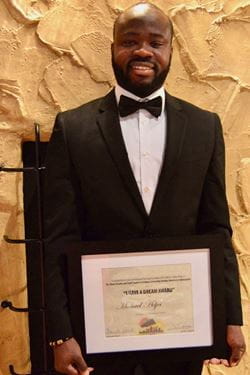 “I thought about maybe doing pharmacy or pharmacology,” he said. “But in the back of my mind, I knew if I didn’t become a doctor, it would haunt me forever. These challenges tested me to see if I was really passionate about this journey.”
“I thought about maybe doing pharmacy or pharmacology,” he said. “But in the back of my mind, I knew if I didn’t become a doctor, it would haunt me forever. These challenges tested me to see if I was really passionate about this journey.”
On his third round of applications, he landed an interview with IU School of Medicine. His interviewer, Marly Bradley, JD, MD, now the school’s ombudsperson, and Karen Smartt, IU School of Medicine Director of Admissions, encouraged him to consider the MSMS Program.
“In the MSMS Program, I met a group of friends with similar backgrounds and challenges,” said Adjei, the first in his family to go to college. “I was supported by my classmates and faculty, and I was provided with resources that prepared me very well for medical school.”
Once in medical school, Adjei wanted to help others achieve their dreams. He founded the MSMS student interest group, connecting current MSMS students with program alumni – now IU medical students – for multi-tier mentorship.
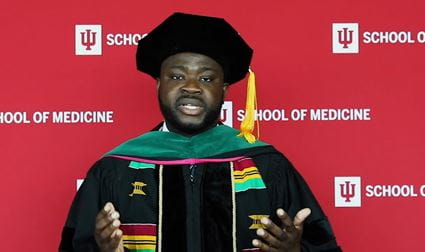 “Michael came to us with the idea,” said MSMS Program Director Vicki Bonds, MS, MEd. “Medical students in the student interest group help us with recruitment, promotions, mentoring, campus tours and interview days, and volunteer to share their experiences at lunch-and-learns. Many also serve as tutors. They’re kind of like big brothers or big sisters.”
“Michael came to us with the idea,” said MSMS Program Director Vicki Bonds, MS, MEd. “Medical students in the student interest group help us with recruitment, promotions, mentoring, campus tours and interview days, and volunteer to share their experiences at lunch-and-learns. Many also serve as tutors. They’re kind of like big brothers or big sisters.”
It's the “spirit of Michael,” she said, that inspires program alumni to pay it forward.
“Michael is philanthropic, very collegial and collaborative,” Bonds said. “He is a person who can organize and gather like-minded people to accomplish goals.”
Nominated by Bonds, Adjei received the I Have a Dream Award from the IUPUI Black Student Union and Black Faculty Council in 2018.
“In difficult times, reflect on how far you’ve come,” he said in a video for the recognition event. “If you were able to work hard to get to where you are today, that same hard work will take you where you want to go.”
 Two years later, Adjei was selected by his peers as the Class of 2020 student commencement speaker. He also served alongside Smartt on the Admissions Committee during his final year of medical school.
Two years later, Adjei was selected by his peers as the Class of 2020 student commencement speaker. He also served alongside Smartt on the Admissions Committee during his final year of medical school.
Smartt, Bonds and Emily Walvoord, MD, associate dean for student affairs, were among guests at Adjei’s recent wedding. He and his wife, Ami, a resident in radiology, both came to IU School of Medicine via the MSMS program. The festive wedding, which included traditions from both Ghana and Kenya (Ami’s heritage), “felt like a mini-reunion” of MSMS alumni, said Bonds. She likes seeing how program graduates remain close long after matriculating into medical school and starting their careers.
“Most of the bridal party were their colleagues from IU School of Medicine,” Bonds observed. “They are our first couple, that I know of, who went through the program and later got married.”
‘Leave a trail for others to follow.’
Adjei was selected as chief resident by vote of anesthesiology faculty and his resident peers.
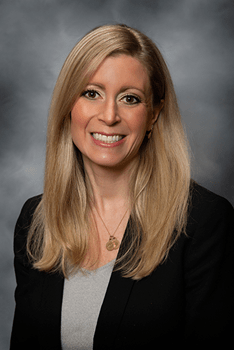 “Michael has everything that makes a good leader–he is hardworking, advocates for those underrepresented in medicine and for the residency as a whole, has a positive attitude, leads by example, communicates well, takes initiative, and he's fair and open-minded,” said Jennifer Stewart, DO, Anesthesia Residency Program director.
“Michael has everything that makes a good leader–he is hardworking, advocates for those underrepresented in medicine and for the residency as a whole, has a positive attitude, leads by example, communicates well, takes initiative, and he's fair and open-minded,” said Jennifer Stewart, DO, Anesthesia Residency Program director.
Adjei’s decision to specialize in anesthesiology seemed destined. In his undergrad program, he was required to shadow a physician. He sent out dozens of inquiries, and the only two physicians who responded were anesthesiologists. During his first year at IU School of Medicine, he met another anesthesiologist, Christopher Eddy, MD, at church and began shadowing him at Sidney and Lois Eskenazi Hospital in Indianapolis.
While Adjei enjoyed his other medical school rotations, he ultimately decided, “Anesthesia is a field where you can combine aspects of all specialties.”
Inspired by the saying, “Go where there is no path and leave a trail,” Adjei has become an ambassador for the anesthesia program and other IU School of Medicine residencies, promoting them to diverse candidates at national conferences including the American Medical Association (AMA) and Student National Medical Association (SNMA).
Adjei recently was selected to participate the inaugural class of the AMA and University of Cincinnati Resident Diversity Leadership Development Program, a cohort-based leadership program for residents from URiM backgrounds which engages residents in a leadership curriculum, provides the opportunity for participants to meet and engage with leaders in academic medicine from similar backgrounds, and helps them lead diversity, equity and inclusion projects at their home institutions. As part of this program, Adjei aims to increase overall diversity in the field of anesthesiology by strengthening pathway opportunities and exposing high school students to the possibility of a career in anesthesia.
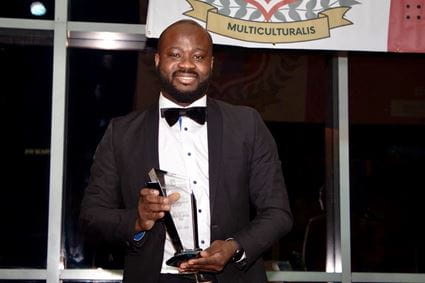
At IU School of Medicine, Adjei is member of the Graduate Medical Education (GME) Dean’s Council, where he and fellow leaders meet with Dean Jay Hess, MD, PhD, MHSA, to discuss current issues and topics important to GME trainees. He also mentors several URiM medical students.
When Shachia Jackson first came to Indianapolis as a student in the MSMS Program, Adjei’s support helped her feel that she belonged.
“Michael's efforts have played a crucial role in ensuring that being a minority student at a large institution does not feel isolating,” said Jackson, now a fourth-year medical student.
Francis Nwaneri, MD, met Adjei early in his days as a medical student. He is now a first-year resident in anesthesiology, excited to see Adjei named as chief resident for 2023-24.
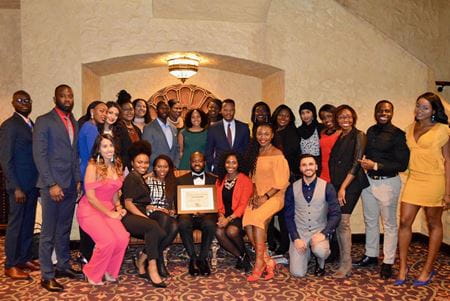 “His hard work and dedication to diversity, equity and justice initiatives have always been at the forefront of his time here at IU, and his commitment to the field of anesthesiology has been inspiring,” Nwaneri said.
“His hard work and dedication to diversity, equity and justice initiatives have always been at the forefront of his time here at IU, and his commitment to the field of anesthesiology has been inspiring,” Nwaneri said.
Jackson is also applying for a resident position in anesthesiology.
“Throughout my journey, I have faced numerous trials and challenges, and Michael has been there to witness the tears and frustrations that accompanied them,” she said. “However, his unwavering encouragement always concludes with a powerful reminder: my dreams are achievable, regardless of the circumstances.”
